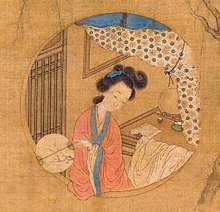Li Xiangjun
Li Xiangjun (Chinese: 李香君; 1624–1654) was a courtesan, singer, and musician during the Ming dynasty. Her life was dramatised in the play The Peach Blossom Fan.
Li Xiangjun | |
|---|---|
 Painting of Li Xiangjun 1817 | |
| Native name | 李香君 |
| Born | 1624 Suzhou, Ming China |
| Died | 1654 (aged 29–30) Qing China |
| Pen name | Li Xiang 李香 |
| Occupation | Courtesan, poet, musician |
| Language | Chinese |
| Partner | Hou Fangyu 侯方域 |
| Relatives | Li Zhenli 李貞麗 (adopted mother) |
Biography
Li is referred to as Li Ji (Chinese: 李姬) or Li Xiang (Chinese: 李香) in contemporary sources. To demonstrate respect for her, later scholars appended the character jun (Chinese: 君) to her name.[1] Her courtesy name was Shanzhui (Chinese: 扇坠).
No written records from the time Li lived record where she was born, but popular modern theories suggest that she was the daughter of an official, who was demoted and his family either killed or sold.[2] Li was adopted by the owner of a brothel in Nanjing called Meixiang House (Chinese: 媚香樓), whose surname she took. She was taught to dance, sing, paint, play music, and write poetry. Meixiang House was a favoured brothel of the literati and officials, with Li's adopted mother known for her generosity and chivalry.[3] By age 13, Li was renowned for her singing and playing the pipa that her mistress charged 20 gold taels per guest to see her.[4]
Li met Hou Fangyu at Meixiang House in 1648. Hou sent her poems and Li performed for him in return.[5] When Hou left to sit the imperial examinations (which he failed), Li waited for him and refused to perform for the inspector general of Huaiyang County.[5] Li's romance with Hou Fangyu has been called one of the greatest romances of Chinese history.[6]
She is one of the Eight Beauties of Qinhuai (Chinese: 秦淮八艳) described by late Qing officials. The other famed courtesans of this group are Ma Xianglan, Bian Yujing (卞玉京), Dong Xiaowan, Liu Rushi, Gu Mei, Kou Baimen (寇白門), and Chen Yuanyuan.[7]
Residence
The residence of Li Xiangjun (Chinese: 李香君故居) is open to the public as part of Nanjing's literary cultural heritage.[8] It is located in Nanjing, in the vicinity of Fuzimiao on the Qinhuai River.[9]
References
Notes
- Wang (2011), p. 88.
- Wang (2011), p. 88-89.
- Yu (1693).
- Wang (2011), p. 89.
- Hou (1712).
- Liu 刘, Lei 磊 (6 March 2009). "李香君——"秦淮八艳"里的硬骨头" [Li Xiangjun: the hard hear of the 'eight beauties of Qinhuai']. Nanjing Chenbao (in Chinese). Retrieved 12 September 2017.
- Xie & Shi (2014), p. 181.
- Zhang (2007), p. 43.
- Zhang (2007), p. 42.
Works cited
- Hou Fangyu 侯方域 (1712). "李姬传" [Tale of Woman Li]. 壮悔堂文集 [Zhuanghuitang Collected Works] (in Chinese). Retrieved 13 September 2017.
- Wang 王, Chen 晨 (2011). "秦淮河上真实的李香君——李香君身世与才貌考" [The real Li Xiangjun of Qinhuai River: Consideration of Li Xiangjun's reality and talents]. Yuwen Xuekan (in Chinese) (6): 88–89 & 94.
- Xie 谢, Yongfang 永芳; Shi 施, Qin 琴 (2014). "像传题咏与经典重构———以《秦淮八艳图咏》为中心" [Acclaim for portraits and classical reconstruction: 'Qinhuai bayan tuyong' as the centre]. Zhongguo Wenhua Yanjiu (in Chinese) (2): 180–188.
- Yu 怀, Huai 怀 (1693). 板桥杂记 [Notes from Banqiao] (in Chinese).
- Zhang 张, Weiya 维亚 (2007). "文学旅游地的遗产保护与开发——南京夫子庙李香君故居和王谢古居案例研究" [On the Heritage Protection and Development of Literary Tourism Destinations —— Taking Li Xiangjun Former Residence and Wang Xie Ancient House in Nanjing Confucius Temple as A Case]. Luyou Xuekan (in Chinese) (3): 40–44.